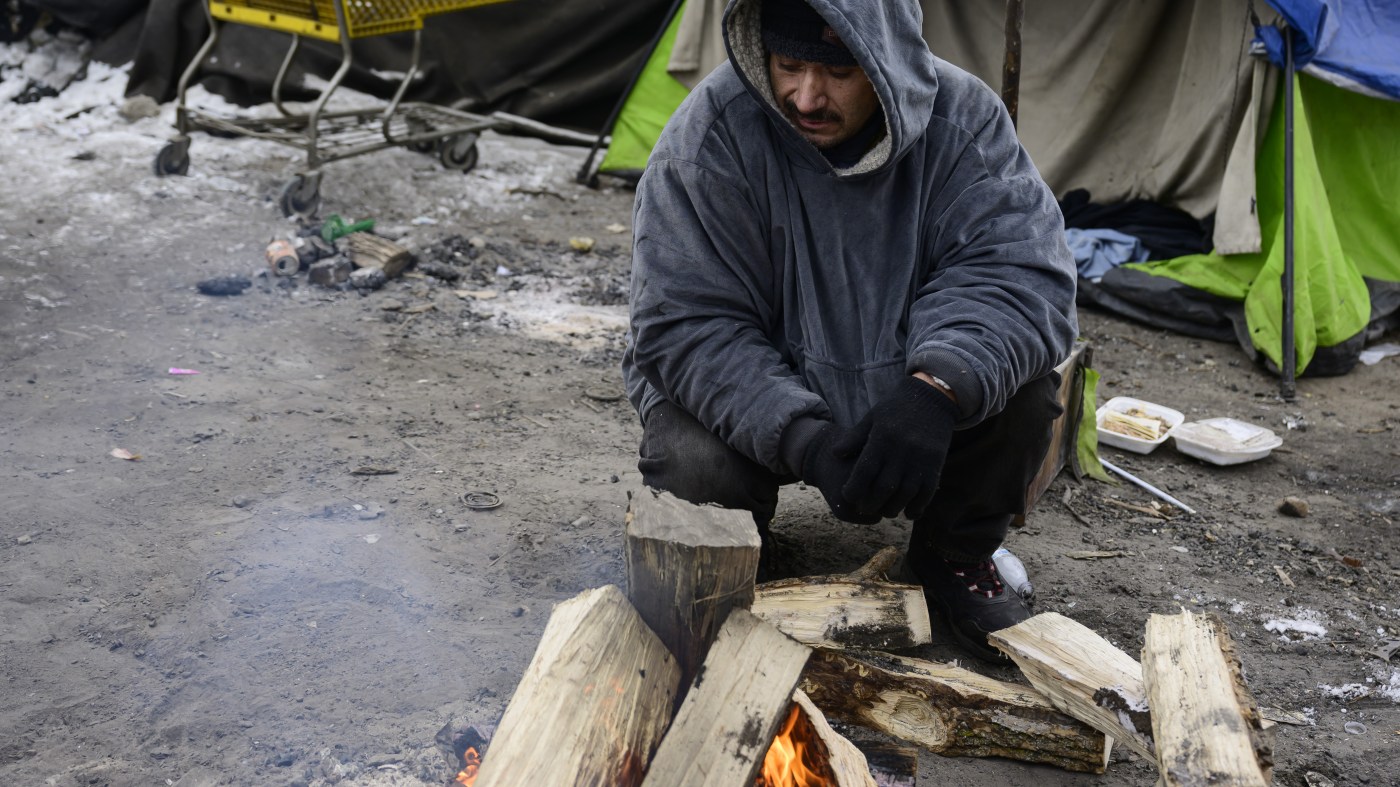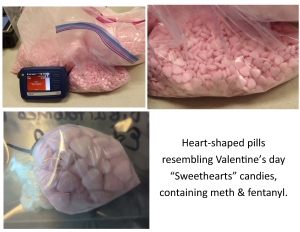
Down to the wire: Bruce Vento Trail homeless encampment faces expulsion Thursday
Against bone-chilling cold, Jose Ismael squatted next to a makeshift campfire within the Bruce Vento Nature Sanctuary in St. Paul on Wednesday, contemplating where he and dozens of others living in the sprawling tent encampment around him would end up the next day.
Ismael, a roofer originally from El Salvador, said he hadn’t worked in three months, despite his efforts to land a job. Homelessness was new to him, he said, but “Tent City” — as some outreach workers have dubbed the collection of some 40 odd tents off Payne Avenue and East Seventh Street — has provided at least a small sense of community.
The downtown St. Paul skyline is seen in the distance from a homeless encampment on the outskirts of downtown St. Paul on Wednesday, Jan. 15, 2025. The encampment is scheduled to be cleared out on Thursday, Jan 16. (John Autey / Pioneer Press)
Soon, Tent City will be no more. Citing frequent police and fire calls, the city of St. Paul last week issued orders to vacate to the dozens of encampment residents within the nature sanctuary, effective Thursday. Officials with the city’s Homeless Assistance Response Team and Familiar Faces initiatives, as well as Catholic Charities, were on site Wednesday to help residents pack up their belongings and transport those willing to enter shelters.
“What really led to the closure of this was it got to the point this became dangerous,” said Jennifer Lor, a spokesperson for St. Paul Mayor Melvin Carter’s office. “It solely closed for safety reasons.”
City and county outreach workers will be there again all day Thursday, though social service providers say shelter capacity is tight.
Catholic Charities’ downtown St. Paul Dorothy Day/Higher Ground shelter can take in up to 179 men and 61 women, and has been reaching that capacity nightly. On especially cold nights, the charity allows some visitors to stay in the lobby. Organizers are working to open additional overflow beds for those folks leaving the encampment, an agency spokesperson said on Wednesday.
Still, many Tent City residents remain resistant to emergency shelters, despite the cold.
“A lot of them are just going to leave with nothing,” said Pastor Ger Vang, whose Rice Street-based Living Water International Church has been visiting the Bruce Vento site regularly for more than two years. “They can’t take their tent. They don’t have transportation to take it. They’re going to need a new tent, blankets.”
A volunteer brings food, water, hats and gloves for distribution at a homeless encampment on the outskirts of downtown St. Paul on Wednesday, Jan. 15, 2025. (John Autey / Pioneer Press)
An unprecedented challenge for homeless Hmong residents
Since August, Kabo Yang and a network of some 10 to 20 committed volunteers have made weekly visits to St. Paul homeless encampments frequented by ethnic Hmong and Karen residents. To members of her nonprofit organization, Hmong Haven, another camp behind the vacant Kmart store off Maryland Avenue and Interstate 35E bears the unofficial name “K-City.”
That’s where Ger Vang has set up his “Jesus Tent,” from which he distributes food and uses a microphone to preach the good word every Tuesday. “We feed them, we clothe them, we go love them,” Ger Vang said.
For newcomers to the camp, the Jesus Tent “is like a little hotel tent where they spend a night or two before they get their own tent,” Kabo Yang said. “If people want to go to treatment, they spend the night and we pick them up there in the morning.”
It’s not Hmong Haven’s only regular stop. Outside downtown, Tent City has grown to be an even larger, more diverse encampment, she said. About half the residents there are Hmong men.
A truck from the St. Paul Homeless Assistance Response Team is onsite at an encampment on the outskirts of downtown St. Paul on Wednesday, Jan. 15, 2025. (John Autey / Pioneer Press)
What K-City and Tent City have in common, other than the blistering cold, is that they’ve drawn members of a large, ethnic community for whom living on the street is largely an unprecedented experience.
“This is new,” said Kabo Yang, one Hmong Haven’s three founding board members. “I think it’s the pandemic. It’s housing costs.”
Instead of taking their chances on finding an empty bed, some in the Tent City community are likely to head behind Kmart and join K-City, though Kabo Yang and others have predicted another encampment on Fish Hatchery Road, within Pig’s Eye Regional Park, is likely to draw even larger numbers.
Some are resistant to shelters
Both sites are well removed from downtown and key emergency services, like the free meals and shelter beds at the Dorothy Day campus. Still, some of the Hmong and Karen men who have gravitated to K-City and Tent City have learned to avoid shelters after negative experiences. Even in the bitter cold, they prefer the familiarity of those who quite literally speak their language.
At the Dorothy Day campus or the Union Gospel Mission, “they’d get in, but it was hard for them to ask for I.D.s or help because of language barriers,” Kabo Yang said. “Sometimes, they’d get bullied because of language barriers — not by the staff, but by the people that come there — and they’d have to give up their spot for the night.”
And shelters fill fast, as does emergency housing. Many residential sobriety programs require participants to be able to communicate in English or read at a fifth-grade reading level. “That’s something we’re struggling with,” Kabo Yang said. “There’s not enough places to put people.”
Volunteers help load resident possessions onto a trailer at a homeless encampment on the outskirts of downtown St. Paul on Wednesday, Jan. 15, 2025. (John Autey / Pioneer Press)
Meanwhile, mental health challenges are a kind of new frontier for many Hmong families unaccustomed to seeing mental disorders as treatable conditions along a spectrum of severity.
“One thing about the Hmong community, they’re not familiar with mental health,” Kabo Yang said. “Once their child or family member is having mental health issues, they just think they’re crazy, or possessed. So they’re put out of the house instead of getting the help they need.”
At the camps, fentanyl and other substance abuse issues are not uncommon.
‘It gets crowded over there’
On Wednesday, a man who identified himself only as Pao said he’d been living in the camp for about six months after his car was damaged, cutting him off from work at a factory that makes military equipment. Pao, who said he had made friendships at the Bruce Vento camp, took a dim view of the prospect of moving into a downtown shelter.
“It gets crowded over there,” Pao said. “This place right here, we’re almost free to do what we want. … And it’s safety in numbers. It’s a little bit of both. … To be honest with you, it’s also substance (use). We want to be free out here. Sometimes you need a little time off. I know it’s not the right kind of time off.”
The land that the Bruce Vento camp sits on is technically county-owned, and Ramsey County service navigators have joined the city’s Homeless Assistance Response Team in steering Tent City residents toward homeless shelters and other resources, said Casper Hill, a county spokesperson. The county maintains a one-stop phone number for its support services at 651-266-1050.
To get past language barriers and make connections, the county has contracted outreach teams from the Hmong organization Koom Recovery, the Karen Organization of Minnesota and the Ain Dah Yung Center, which works with American Indian youth and families.
“We’ve been lucky with this particular encampment to receive a lot of outside help,” said Lor, the mayor’s spokesperson. “Our goal is really to get them into permanent housing.”
Related Articles
‘Waiting list to nowhere’: Homelessness surveys trap Black men on the streets
US Justice Department accuses six major landlords of scheming to keep rents high
St. Paul’s second-largest homeless encampment given nine days to move
St. Paul Board of Zoning Appeals blocks Highland Bridge ‘strip mall’ proposal 4-2
Listening House expands program that hires homeless, low-income workers to clean downtown streets


